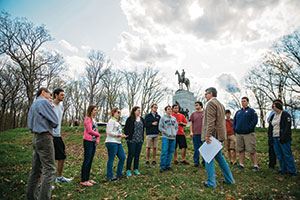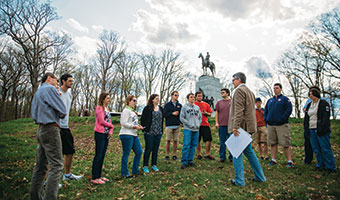May the God of hope fill you with all joy and peace in believing, so that you abound in hope by the power of the Holy Spirit (Romans 15:13).
Many words have been used to describe a liberal arts college. I will use only two: memory and hope.
A liberal arts college is a community of memory. I’m not going to write about personal memories, though we may have many. Rather, I would like to focus on the memories of a community that identifies itself as a liberal arts college related to the church. In Habits of the Heart, Robert Bellah wrote: “Communities … have a history — in an important sense they are constituted by their past — and for this reason we can speak of a … community of memory.”

Miranda Harple/Gettysburg College
Peter S. Carmichael, director of the Civil War Institute at Gettysburg (Pa.) College, leads a workshop near the Virginia Memorial on the battlefields in Gettysburg National Military Park.
The primary purpose, the central purpose, the critical purpose of a liberal arts college is to deal with memories. It exists to lift up memories, to preserve memories, to find memories, to interpret memories. The memories and ideas come from philosophers, poets, playwrights, historians, musicians, artists, theologians, scientists. These memories live in books, music, paintings, plays, experiments. These memories span the centuries, transcend cultures and nationalities, cross boundaries between the east and the west, the north and the south.
Current memories have deep roots and long tentacles. Our memory roots go back to Athens and Jerusalem, to Mecca and Macedonia, to Rome and Constantinople, to Geneva and Wittenberg, to Cambridge and Copenhagen, to Beijing and St. Petersburg, to Wounded Knee and Auschwitz, to Atlanta and Sharpsville.
Memories are also crucial for the life of faith. When the Jewish people celebrate the Passover, they are nourished by the memories of their deliverance from Egypt and recall God’s mighty acts.
My wife Ing and I visited Ellis Island, that marvelous museum of immigration. There in the graffiti were scrawled the words of a Jewish man from what was Czechoslovakia: “My mother brought her candles, the ones you use on Friday night. She brought her Bible, the things that were near and dear to us, which were not important to anybody else, but to us they brought back memories.”
When the Christian community gathers to celebrate the eucharist and take the bread and the wine, we hear the words: “This do in remembrance of me.” For the Christian, the eucharist is the ultimate reminder of Jesus, his life, his death and his resurrection.
Why are memories so important both for an academic community and for a community of faith?
It is because we know that our memories have power. They shape us, they nurture us and they enlighten us. Memories give us wisdom, breadth and depth, perspective.
Because memories are so important in an academic community, we enter into conversation with them. This is precisely, scholar Martin Marty says, the reason for which the Lutheran colleges and universities were designed. As we converse with these memories we critique them, analyze them, absorb them, discard them. Because the memories are so important, we constantly debate which ones should be taught and emphasized. Shall we limit ourselves to the ancient texts? Or the books of the West? The humanities or science? Which books shall be excluded, since we obviously cannot cover all of them?
Avoiding repetition
The memories we choose to nourish or discard are crucial for us as individuals, as liberal arts colleges and also for our civilization. Two examples underscore this idea and reveal how remembering is crucial in avoiding repetition of sordid chapters in human history.
My wife and I remember vividly hearing an address by Elie Wiesel at Duke University, Durham, N.C., in which we came to understand his passion to make sure the world does not forget the Holocaust. If we do, he insisted, it will surely occur again. In From the Kingdom of Memory, he wrote: “If there is a single theme that dominates all my writings, all my obsessions, it is that of memory — because I fear forgetfulness as much as hatred and death.”
Probably as a result of Wiesel’s work, the Holocaust Memorial Museum in Washington, D.C., is open to the public as a constant reminder of the depths both of human evil and heroism.
A second example comes from New Testament theologian Elizabeth Fiorenza, who wrote the important book In Memory of Her. Fiorenza’s scholarly thesis is that Christian theology has failed to remember the role of women in its tradition, and because of this they have suffered a secondary role in civilization. This careful “remembering” by Fiorenza and others has enabled us to reimagine the role of women in church and society.
A community of hope
Because we are a community of memory we are also a community of hope. Philosopher Paul Ricoeur has made this claim: “Hope is remembering.” Hope is not merely a naïve, optimistic view of the future — it is based on memory. It was theologian Søren Kierkegaard who said, “It is not worthwhile to remember that past that cannot become a present.” To which I would add, “that past that cannot become a future.” Memories prepare us to face the future with hope, to live life more fully, to serve more wisely.
It was William Ralph Inge, former dean of London’s St. Paul’s Cathedral, who once said, “Persons who are married to the spirit of the age soon find themselves to be widowers” (quoted in Rumor of Angels by Peter Berger). We could adapt this by saying, “Persons who are filled only with the cultural fads of the moment will quickly find themselves to be empty vessels.” How important it is to remember so we might have hope.
I remember vividly the words spoken by the late Kent Knutson, teacher and president of the former American Lutheran Church. Speaking on 1 Corinthians 13:13, “Now abide faith, hope, and love,” Knutson declared: “Faith looks back and remembers what God has done in history and in Jesus Christ; hope is really the same as faith, except it looks forward in anticipation of what God will do. Love acts in the present.”
We are well into the 21st century. It will not be an easy century. Hopefully the memories you have will serve you well as you face this new age. May you continue to use the memories that give meaning and hope and power for your life, and may you never forget that you belong to a community of memory and hope.





